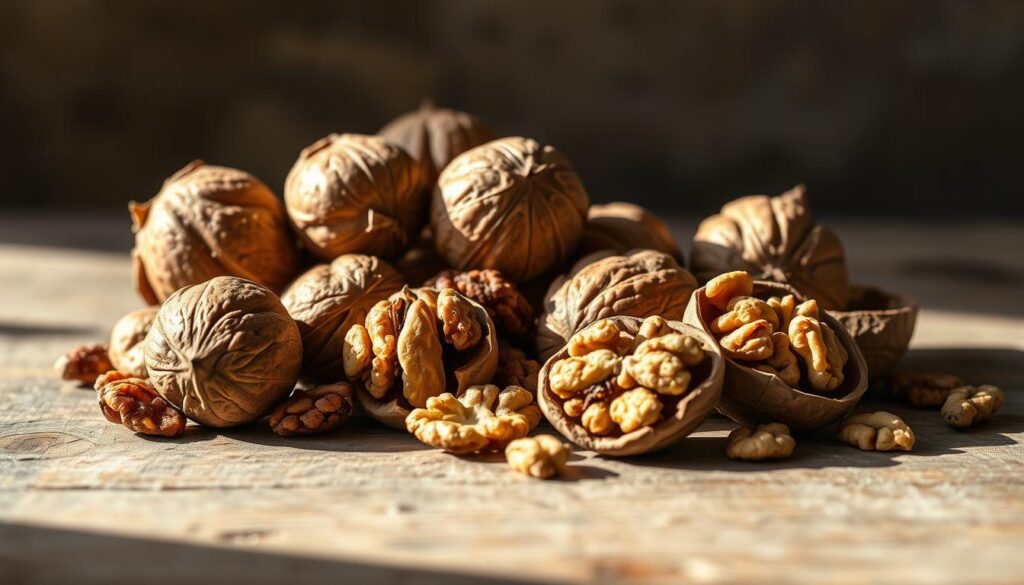th Benefits of Walnuts:
Why are walnuts so important for a healthy diet? Adding them to your daily meals can greatly improve your health. Walnuts are packed with nutrients and antioxidants, making them a great choice for a balanced diet. They offer a delicious taste and a boost of nutrition.
Introduction to Walnuts
Walnuts are a healthy food that can really benefit your health. They are full of nutrients and offer many health perks. That’s why they’re called “nature’s brain food.”
Key Takeaways
- Walnuts are a nutritious food that provides numerous health benefits
- Incorporating walnuts into your daily diet can have a positive impact on overall health
- Walnuts are a rich source of essential nutrients and antioxidants
- Walnuts are considered a healthy food option for those seeking to improve their diet
- Walnuts have been shown to have a positive impact on cognitive function and overall well-being
What Are the Benefits of Walnuts? A Scientific Overview
Walnuts are known as one of the healthiest nuts because of their high nutritional value. They are packed with omega-3 fatty acids, antioxidants, and fiber. As a dry fruit, walnuts add health benefits to any diet. They are great for meals and snacks, boosting your nutrient intake.
Walnuts are good for your heart and brain. They are full of healthy fats like alpha-linolenic acid (ALA), which fights inflammation. Walnuts also have antioxidants that protect cells and lower disease risk.
Key Nutritional Components
- Omega-3 fatty acids
- Antioxidants
- Fiber
- Protein
Research-Backed Health Advantages
Research shows walnuts can lower heart disease risk and boost brain function. They are also a healthy snack for weight management. Walnuts are high in fiber and protein, helping you feel full and satisfied.
Daily Recommended Intake
The amount of walnuts you should eat daily depends on your calorie needs and health goals. Aim for 1-2 ounces, or 14-28 grams, per day. You can add walnuts to oatmeal, yogurt, or use them as a salad topping.
The Remarkable Brain-Boosting Properties of Walnuts
Walnuts are known as a brain food because they have lots of good stuff for your brain. They are full of antioxidants, omega-3 fatty acids, and other important nutrients. This makes them a great snack for keeping your brain healthy.
Studies have found that eating walnuts can help your brain work better. They can improve your memory and focus. The antioxidants and polyphenols in walnuts fight inflammation and stress in the brain. This can help prevent diseases like dementia.

- Alpha-linolenic acid (ALA), a type of omega-3 fatty acid
- Antioxidants such as vitamin E and polyphenols
- Minerals like magnesium and potassium
These nutrients help keep your brain healthy. They might also lower the risk of losing brain function as you get older.
Eating walnuts is an easy way to support your brain. With their many nutrients and brain benefits, walnuts are a smart choice for a healthy diet.
Heart Health and Cardiovascular Benefits
Eating healthy foods like walnuts is key for heart health. A diet full of nutritious foods can lower heart disease risk. Walnuts, with their special mix of nutrients, are great for the heart.
Adding walnuts to your meals can boost your health, including your heart. What you eat greatly affects your heart health. Walnuts are a smart choice for a healthy diet.
Impact on Cholesterol Levels
Walnuts can lower cholesterol levels, which is good for the heart. Their unique nutrients, like omega-3 fatty acids, help fight heart disease.
Blood Pressure Management
Walnuts also help manage blood pressure, a key heart health factor. Their nutrients can lower blood pressure and keep the heart system healthy.
Omega-3 Fatty Acids Benefits
The omega-3 fatty acids in walnuts offer many heart health benefits. These fats reduce inflammation, improve blood fats, and prevent clots. All these help lower heart disease risk.
Weight Management and Metabolic Health
Walnuts are key for healthy weight management and metabolic health. They have fiber, protein, and healthy fats. These nutrients help you feel full, support your metabolism, and can help with weight loss.
Eating walnuts as part of a healthy diet can help you reach your weight goals. The fiber and protein in walnuts slow digestion. This makes you feel full longer and helps prevent overeating. The healthy fats in walnuts also support heart health and reduce inflammation.

Some key benefits of walnuts for weight management and metabolic health include:
- Supporting feelings of fullness and reducing hunger
- Aiding in weight loss and maintenance
- Supporting heart health and reducing inflammation
Adding walnuts to a healthy diet can positively affect weight management and metabolic health. With their mix of fiber, protein, and healthy fats, walnuts are a tasty and nutritious choice for a weight management plan.
Anti-Inflammatory and Antioxidant Properties
Walnuts are known for their high antioxidant levels. These antioxidants help protect the body from free radicals. Free radicals can damage cells and increase the risk of chronic diseases.
Walnuts have more antioxidants than many other nuts and dry fruits. This makes them a great choice for a healthy diet.
The antioxidants in walnuts come from polyphenols and other phytochemicals. These compounds fight free radicals. This reduces inflammation and boosts health.
Walnuts have a higher antioxidant capacity than other nuts. This can help lower the risk of heart disease, cancer, and other oxidative stress-related conditions.
- Reducing inflammation, which can help manage arthritis and other inflammatory diseases.
- Protecting against cell damage, which can lower the risk of cancer and neurodegenerative diseases.
- Supporting heart health by reducing the oxidation of LDL cholesterol, which decreases heart disease risk.
Eating walnuts can increase your antioxidant intake. They are not only tasty but also a healthy option among nuts and dry fruits.
Digestive Health and Gut Microbiome Benefits
Walnuts are a nutritious food that offers many health benefits. They support a healthy gut. The prebiotic fiber in walnuts feeds the good bacteria in the gut. This helps keep the gut microbiome balanced.
A healthy gut is key for overall health. Walnuts can be a great addition to a balanced diet. Their fiber acts as a prebiotic, nourishing the good bacteria in the gut.
This can improve digestion, boost the immune system, and even help with mental clarity. As a nutritious food, walnuts can be added to meals and snacks. They support a healthy gut and overall health.

Walnuts also have anti-inflammatory properties. This can help lower the risk of chronic diseases. As a nutritious food, walnuts are a valuable part of a balanced diet. They provide essential nutrients and support overall health and well-being.
Cancer-Fighting Properties of Walnuts
Walnuts have been found to have cancer-fighting properties. They are a great addition to a healthy diet. Research is ongoing to understand how walnuts help prevent cancer.
Studies show that walnuts’ unique mix of nutrients and antioxidants may lower cancer risk. Walnuts are packed with polyphenols, omega-3 fatty acids, and other compounds. These have been linked to cancer prevention.
Key Findings
- Research suggests that eating walnuts may lower the risk of breast, prostate, and colon cancers.
- The antioxidants and polyphenols in walnuts protect cells from damage and inflammation. These are factors in cancer development.
- Walnuts also have anti-inflammatory properties. This may help in preventing cancer.
Eating walnuts can be a simple way to support your health. It may also lower the risk of certain cancers. With their nutritional value and cancer-fighting properties, walnuts are a tasty and healthy choice.
Incorporating Walnuts into Your Daily Diet
To enjoy the health benefits of walnuts, add them to your daily meals. They’re perfect for those who love foodporn or seek healthy options. Walnuts are also great for vegan diets, providing protein in various dishes.
Try adding walnuts to oatmeal or yogurt in the morning. They’re great on salads or healthy food bowls. Blend them into smoothies for extra nutrition. Enjoy them as a crunchy snack or with dried fruit for a sweet treat.
Creative Serving Suggestions
- Add walnuts to your favorite salad recipe for a crunchy twist
- Use walnuts as a topping for vegan ice cream or frozen yogurt
- Blend walnuts into your favorite smoothie recipe for an extra boost of nutrition

Storage Tips
Keep your walnuts fresh by storing them right. Place them in an airtight container in the fridge or freezer. This keeps them fresh and preserves their nutrients.
Portion Control Guidelines
Walnuts are a healthy food choice, but watch your portions. Aim for 1 ounce, or 14 halves, daily. This helps avoid eating too much.
Potential Side Effects and Considerations
When you eat nuts, like walnuts, it’s important to know about possible side effects. Allergies are a big concern, ranging from mild to severe. People with tree nut allergies should be careful when trying walnuts.
Other things to think about include how nuts might affect your medications, like blood thinners. Some people might also have digestive problems. Always talk to a doctor before changing your diet, if you have health issues.
- Start with small amounts and gradually increase consumption
- Choose high-quality, fresh walnuts
- Be aware of possible interactions with medications
By being careful and taking the right steps, you can enjoy walnuts’ health benefits. This way, you can avoid most risks.
Comparing Walnuts to Other Nuts
There are many nuts to choose from, each with its own benefits. We’ll look at how walnuts stack up against other nuts in terms of nutrition and cost.
Walnuts are packed with omega-3 fatty acids and antioxidants. They also have a lot of fiber, protein, and healthy fats. Here’s a quick look at what some popular nuts offer:
- Almonds: high in vitamin E and magnesium
- Walnuts: rich in omega-3 fatty acids and antioxidants
- Pecans: good source of zinc and magnesium
- Brazil nuts: high in selenium and magnesium
Walnuts are pricier than many other nuts. But their special nutrients and health perks make them worth it. They’re a smart choice for adding a tasty, nutritious snack to your day.

Selecting and Storing Walnuts for Maximum Benefits
To get the most out of your walnut purchase, it’s essential to know how to select and store them properly. When choosing walnuts, look for those that are heavy for their size and have a hard, unbroken shell. This will ensure you’re getting a fresh and high-quality walnut.
For optimal storage, keep walnuts in an airtight container in the refrigerator or freezer. This will help maintain their freshness and prevent spoilage. It’s also important to keep them away from direct sunlight and heat sources, as this can cause the walnut to become rancid.
Here are some tips for storing walnuts:
- Store walnuts in a cool, dry place
- Keep them away from strong-smelling foods, as walnuts can absorb odors easily
- Freeze walnuts for up to 12 months to maintain their freshness
By following these simple steps, you can enjoy your walnuts for a longer period while maintaining their nutritional benefits. Proper storage is key to preserving the quality and freshness of walnuts, so be sure to handle them with care.
Conclusion: Making Walnuts Part of Your Healthy Lifestyle
Walnuts are a superfood full of nutrients and health benefits. They can boost brain function, support heart health, and help with weight management. Adding walnuts to your diet is a simple way to live healthier.
Enjoy walnuts as a snack, on salads, or in smoothies. They are tasty and good for you. Regularly eating walnuts can improve your health and well-being.
Just remember to eat walnuts in moderation. They are part of a balanced diet. With their many benefits, walnuts are great for anyone looking to eat healthier. Start adding them to your meals today.





